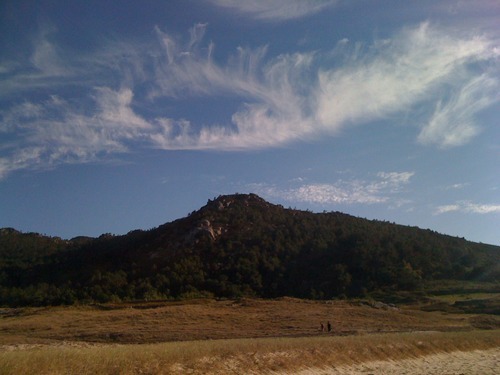Tales behind “Train Tracks and Travelogues Vol.2”

“Ubiquitous Eucalyptus” is the kind of title that makes alot of people- and I put myself in this category- feel irritated by what they perceive as an artist’s unbearable self-indulgence and pretension in naming their works. If I’m honest, the knowledge of this was a motivating factor in deciding to use the title- although not the actual reason for its choice, as I’ll explain shortly- and I didn’t have to wait long for someone to respond, after listening to the CD: ” You’ve called one of the tracks “Ubiquitous Eucalyptus”- of course you f***ing have”. Nothing if not predictable when it comes to living down to expectations…..
The area of Spain that inspired the track is in Galicia, the North-Western part of the country, and it’s fair to say that it is absolutely covered in Eucalyptus trees, to the point that they are, well, ubiquitous. I first encountered this walking part of the Santiago Trail- apart from looking amazing they do of course give off in an incredibly potent and quite intoxicating scent, particularly when walking though a forest of them on a hot summer’s day. It’s like wandering through some kind of Vicks-based world of natural legal highs, and an exhilarating experience. The reason for the whole province being carpeted in them is down to something a little more prosaic, and is not without some rather depressing side-effects. Some time in the 60s/70s, Franco decreed that Eucalyptus should be planted far and wide across Spain to create an instant paper-bark industry, which provided much needed money for the Spanish economy. Although this resulted in a short-term financial boost to the country, the longer term issue is that the trees- as they are notorious for doing- have eroded the soil so badly that they have effectively transformed vast swathes of the land in the area into a barren wasteland on which nothing can be grown. Just what Spain- and indeed the rest of Europe- needed: another metaphor for the negative effects of short-term capitalist thinking…..
This part of Spain is know for its Fiestas, which in the summer months occur at a frequency of roughly one every four hours. The Spanish attitude to fireworks is rather like a ten-year old’s to swear words: no matter how many times they use them, they simply never tire of them; they literally cannot get enough of them, all hours of the day or night- more often in broad daylight when they can’t actually be seen- fiesta or no fiesta, onloookers or no onlookers. i asked a friend of Pete’s, on whose boat we were staying in Galicia, how the country could be pleading poverty and simultaneously letting off thousands of Euros of fireworks every weekend, and he admitted rather sheepishly that “it didn’t look good, but what can you do?”. (Incidentally, this same guy, Javier, enthusiastic sailor, even more enthusiastic dope-smoker, was talking about all the unsold flats in Ares that were the result of dodgy building contracts, and expressed surprise that they weren’t being snapped up by foreign investors, “Because,” he said, “they is really nice, very smart, all with fitted chickens.”)
The exuberance of the night life in the area, the absolute cultural birthright of every Spaniard to go out every night, for as long as they wish, is what I hoped to capture in “Ubiquitous Eucalyptus”. There is a very strong folk tradition in the area- a lot of accordion and, egads, bagpipe playing- which Pete, no mean accordionist himself, has immersed himself in during his forays in to the bars of Ares, La Coruna and beyond. (I’ve recently started a found-sound project called Redez, the first track of which “En Vacances” includes recordings of Pete’s playing, plus the inevitable fireworks, all made in the Galician area.) Even when virtually destitute, the Spanish would rather die than not go out in the evening, and they are, it has to be said, very good at it, able to party all night and as a point of pride be able to turn up at work the next morning fully functioning. It is with some embarrassment that I recall a meal out in Ares that we had which rather highlighted the different cultural approaches to going out- whilst the immaculately turned out diners at the surrounding tables carefully nibbled at their food and sipped red wine from large glasses in impeccably small measures, our own table looked as though someone had performed a recent seafood-based sacrifice on it, bits of squid and sardines all over, and under, the table, a forest of beer glasses testament to the innate barbarity of our Anglo-Saxon eating habits. And whilst you could safely have ironed your laundry on the pristine white paper tablecloths of our fellow diners, the surface of our own table was starting to resemble a Festival toilet floor. Finally, when our coffees arrived, a small flagon of the local spirit was provided to drop in to our cups, which we dispensed of in suitably -disgustingly- large amounts, vaguely wondering whether we hadn’t mistakenly just polished off whatever the waiter had intended to use to refuel the oil lamps on our table with.
Viva España!


Leave a Reply